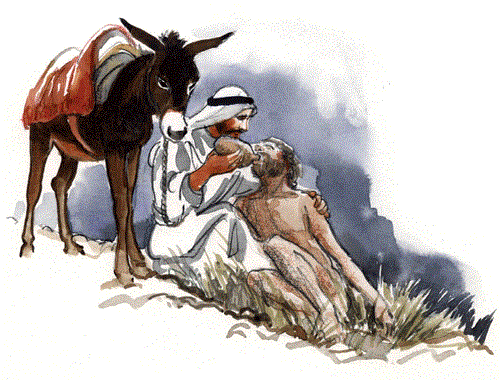
A Neighbor to my Enemy
In Luke 10:25-37, a scholar of the law tested Jesus and said, “What must I do to inherit eternal life?” (Luke 10:25) Jesus answered, “What is written in the law?” The scribe said, “You shall love the Lord, your God, with all your heart, with all your being, with all your strength, and with all your mind, and your neighbor as yourself.” (Dt 6:5, Lv 19:18) Jesus told him that he answered correctly, but added, “Do this and you will live.” (Luke 10:28) The scribe persisted to test Jesus and said, “And who is my neighbor?” (Luke 10:29) Jesus responded in a way that he never expected.
Jesus told him the parable of the Good Samaritan. A man on the road from Jerusalem to Jericho was stripped and beaten by robbers, and left half-dead and exposed on the desert road. A priest and a Levite passed by; Luke was careful to mention that they both saw the dying man, but they didn’t stop to help him. One of the statutes in the Mosaic Law states that “you shall not stand by idly when your neighbor’s life is at stake.” (Lv 19:16) The meaning of this law is that one must extend help in a life-threatening situation. The priest and the Levite should have known this well, and yet they offered no help.
A Samaritan came by and was moved with compassion for the dying man on the road. Not only did he apply first-aid to the man’s wounds, he lifted him up on his animal, brought him to an inn and cared for him. The next day, the Samaritan made provisions for the care of the victim before he went on his way. Jesus asked the scribe, “Which of these three, in your opinion, was neighbor to the robbers’ victim?” He answered, “The one who treated him with mercy.” (Luke 10:36)
Who is my neighbor? In the Old Testament, a neighbor primarily meant a fellow Israelite, even if there were laws on how to treat foreigners in a right and just way. (Lv 19:33-34) Jesus fulfilled that law by teaching that being a neighbor transcends race, ethnicity and culture; an enemy can even be your neighbor. In Jesus’ time, Jews and Samaritans were enemies, but the Samaritan was a neighbor to the victim because the latter desperately needed help and instead of telling himself, “Let the next passer by help him,” the Samaritan took it upon himself to help the victim.
For the Christian, the question “Who is my neighbor?” goes hand in hand with the question, “Who is my enemy?” An enemy is someone who sharpens his tongue, devises wicked schemes and conspires to set traps for you (Ps 64). An enemy is someone who does and wishes evil upon you and has no desire for your well-being. In today’s society, an enemy is someone who is on the other side of the political debate, someone who supports an opposing cause, or someone who holds a different ideology.
The teaching of the parable of the Good Samaritan is not about not having enemies. Even Jesus had enemies. The parable of the Good Samaritan begs the question, “Will I be a neighbor even to my enemy?” If I happen to find my enemy needing help in a life and death situation, will I pass him by or will I take it upon myself to help him? The Samaritan helped his enemy and Jesus tells us, “Go and do likewise.” (Luke 10:37)

Today’s Mass celebrates the Feast Day of the Holy Martyr Saints of China

Attention all Chinese Cursillo participants: there will be a meeting at the Social Hall after the 10:30am Mass today to discuss important items about the retreat. All those who are not participating in the retreat are welcome to attend the closing ceremony at the Carmel Retreat Center on July 31 at 3 pm.

This is a reminder that Fr. Lou Aldrich still has two more online spiritual seminars via ZOOM. These seminars require registration. Details about the seminars and the link to the online registration form have been posted on our church website, WeChat and LINE.
Prayer List:Jiang Mama, Carolyn Johnson, Alice Stanley, Pan Bohao, Wang Dacheng, Long Guorui, Zhang Qiang, Xu Taicheng and Qiu Laihao.